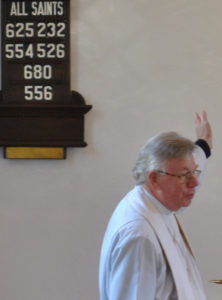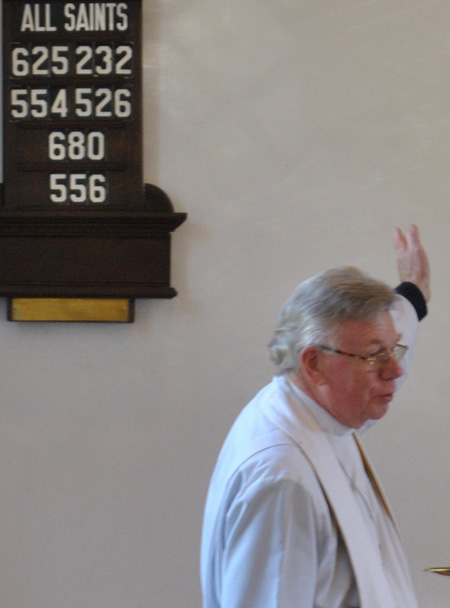No, this is not a sermon from Charles Sydnor’s time at St. George’s. Those sermons are not available and probably never will be. A great loss!

However, on Nov. 6, 2016 he did preach at St. Peter’s Episcopal on All Saints Sunday on the occasion of the celebration of the completion of an Altarpiece as well as a kitchen renovation. I asked him for the sermon and he sent it.
I heard close to 20 years of Charles’ sermons at St. George’s. They were always logically arranged, thought provoking and so well presented. They gave you something to take away. OK, I did get tired of hearing how we were “Easter People.” That aside it was my favorite part of the service.
Here is Charles’ message on Nov. 6 as sent to me.
I am delighted and honored to share in your multiple celebrations today. Not only is this the Feast of all Saints, but a celebration of your significant accomplishments in the restoration of this altarpiece to its original beauty, and also the renewal of your kitchen to equip you to serve.
As I read about the meticulous restoration work under the expertise of Cleo Mullins, I was intrigued to learn that the paintings are on scrap wood, the sides of shipping crates from Gray and Pendleton, merchants in Port Royal; their names are actually visible on the back of the pieces. So, in 1853, St. Peter’s got a Holy start in the cause of recycling
Upon reflection, I think there is a common thread which sews all these celebrations together. As we remember the faithful who have gone before us, the altarpiece and the kitchen are symbols of faithful living. The altarpiece reminds us that faithful living is always centered in the worship of our God, the declaration of our faith in our Triune God, the creed, and seeking to be obedient to God’s commandments, and leading a life of prayer modeled by the Lord’s prayer with all centered in Jesus and the cross. And there is all that beautifully set before us. The connection to the kitchen might be summarized in one of those pithy phrases I once saw at the end of a church bulletin which simply said, when the worship over, the service begins. Kitchens not only equip us to be fed but to serve the hungry, and provide one way of building community. Often persons have described the two parts of our Eucharist as the fellowship of the word and the fellowship of the table. Thus, we could say that in this celebration of the restored altarpiece and renewed kitchen, we have active symbols of the fellowship of the word and table which empower us to live faithfully.
Our Gospel for today directs our attention to what faithful living looks like. It reminds us that love is always a verb more than a noun. It is about how we act all summed up in the very familiar Golden Rule: “Do unto others as you would have them do unto you.” In previous centuries and varying religions, the golden rule was phrased in negative terms. It was called the Silver Rule: “Do not do to others what you would not want them to do to you.” A similar construction comes from the Roman philosopher, Seneca, who lived during Jesus’ lifetime; Seneca said, “Expect from another what you have done to another,” from which we probably get the familiar saying, “You reap what you sow.” Seneca’s language is about waiting to get what you deserve. If you have done a good thing for someone, you can expect good in return. If you have been nasty, you may expect the ax to fall in due time. It is about reciprocity: you scratch my back and I’ll scratch yours; or, more ominously, you will get what is coming to you.
But the words of Jesus are not spoken in the negative but the positive. The words of Jesus focus on what we are to do. The distinction made by Luke’s wording of Jesus’ Golden Rule points to the world of difference between an ethic that existed before Christ and the one we have in and through and from him.
Without our relationship to God in Christ, the words of the Golden Rule could be disastrous. Here’s what I mean. I have met people who carried such a load of guilt about something they had done, something wrong, that they hated themselves. I have met people who were so down on themselves that when they got sick they thought they deserved to be sick; it was a sort of just punishment for being bad. If that negative self-attitude is what you think of yourself, then it could be very problematic for you to do unto others as you would have them do to you, for you might feel that you deserved bad treatment and therefore they might too.
But we have been baptized into a different understanding of ourselves. We have a God who treats us not as we deserve, but as God knows and loves us in Jesus Christ. God loves us with a love that cannot be broken. We are blessed to be God’s adopted children, part of the community of the faithful, even when we stray.
And I am certainly among those who stray. I am a member of an Interracial Conversation Group where I live now in Northumberland County. In our first meeting, we were each asked to introduce ourselves and say why we were there. I said my name is Charles and I hope that I am a recovering racist and I’d like to grow in my recovery because I’m not there yet.
You see I believe that because we are God’s beloved we must live out of and because of the love we have received. Because I know that I am beloved of God, I am free to look honestly at myself and with the grace of forgiveness, change. We are truly blessed by our God who loves us.
I cannot forget a check-out clerk at the Giant in Fredericksburg. When I or anyone else went through her line and engaged in the usual pleasantries of saying how are you, she always answered very clearly and firmly, “I am blessed.” She said it so emphatically that it was startling. Later the Free Lance Start did an article about her greeting, and in the article, we learned that by most standards, her life was far from blessed, with many problems and limited resources, yet she could say I am blessed, for she believed that she, baptized into Jesus, was in relationship to a God who loved her and would not let her go.
I am also reminded of a member of our Brotherhood of St Andrew’s at St. George’s in Fredericksburg who when I greeted him and asked how he was, would always say, “I’ve got it made.” Now that could sound arrogant unless you knew where he was coming from. He simply meant that in spite of all of his failures, God still loved him, so he could say, “I’ve got it made.”
Yes, we have every right and the awesome privilege of saying we are blessed and we have it made. But not because of anything we have done, but only because of what God has done for us in Jesus Christ.
But if we are blessed and have it made, then what is this business of Jesus saying woe to you who are rich, for you have received your consolation, woe to you who are full now, for you will be hungry, woe to you who are laughing for you will mourn and weep? It is a reminder that those who live in the illusion of self-sufficiency, trusting only in themselves, trusting only in their achievements for their happiness, will find that kind of happiness fragile and fleeting.
Another purpose served by these woes might also be to counteract the prosperity theology of our time. Such theology says that success and wealth are signs of God’s favor and by implication poverty and hunger could be signs of God’s disfavor. These beatitudes say it is not that way in God’s kingdom.
The heart of our Gospel today is when Jesus says love your enemies, pray for those who abuse you. That is a command even more demanding than treating people in the way we want to be treated. He specifically says do not retaliate; do not look for ways to give them what they deserve; do not engage in revenge. These are specific actions of faithful living in God’s Kingdom which the best of us find challenging. It is a high ethical standard. How many congregations specifically pray for their enemies on Sunday morning, and if they do will probably have someone accosting the pastor afterwards saying, “Why are we praying for our enemies. We have soldier’ in harm’s way, don’t you know!” Yet I have heard how transformative it has been when churches in communities fraught with street violence, pray by name for both the victims and the one who shot them. Such prayers remind us of our hope for redemption for all people. Such prayers remind us that victims and perpetrators are both God’s children, made in God’s image. Such prayers humanize rather than demonize our enemies.
While we who are citizens of God’s kingdom have a radical ethic set before us, we do need to remember that the command does not insist that we drum up positive emotions about our enemies. As I said earlier, love is a verb more than a noun. You can love your enemy without liking your enemy. Love of enemy does not exclude seeking justice. But it does mean living in the hope and acting toward the possibility that the enemy’s life can be conformed to the goodness God desires for all people. When we demonize those with whom disagree by name calling, we open the possibility of doing anything we want to them if they are less than human.
On the eve of surely the most divisive Presidential Campaign I have ever experienced, regardless of who wins, we are in need for much healing as a country. This love of enemy and prayer for those who abuse – this adherence to the Golden Rule – is about turning what could continue to destroy persons and communities into actions that have the potential for healing.
On this All Saint’s Day, we do well to remember that we are in the company of all the faithful who have gone before us. Or as someone has said, the church is always full because we celebrate with angels, archangels, and all the company of heaven. We are not the first to face divisive times. Can we Imagine what it must have been like to sit in these very pews during and after our horrible Civil War? Yet the church survived and society began to heal because God’s justice does prevail and will prevail.
We now need to turn to and own our high ethic which can bring healing and creates community. I am glad we had the gift of this Gospel reading on this day. It feels to me like God is saying, now listen up!
Now more than ever we need to do unto others as we would have them do unto us. Because we are God’s beloved; this is how we are called to live.
AMEN
